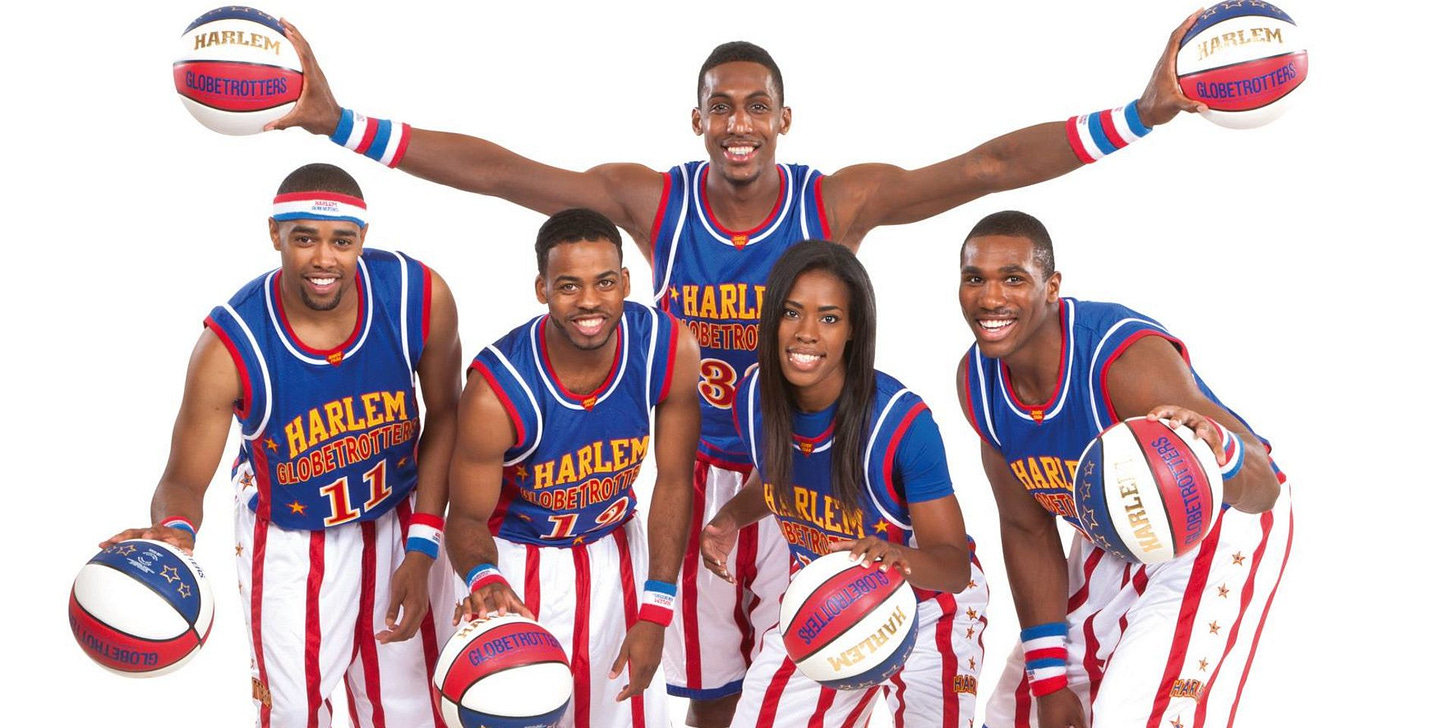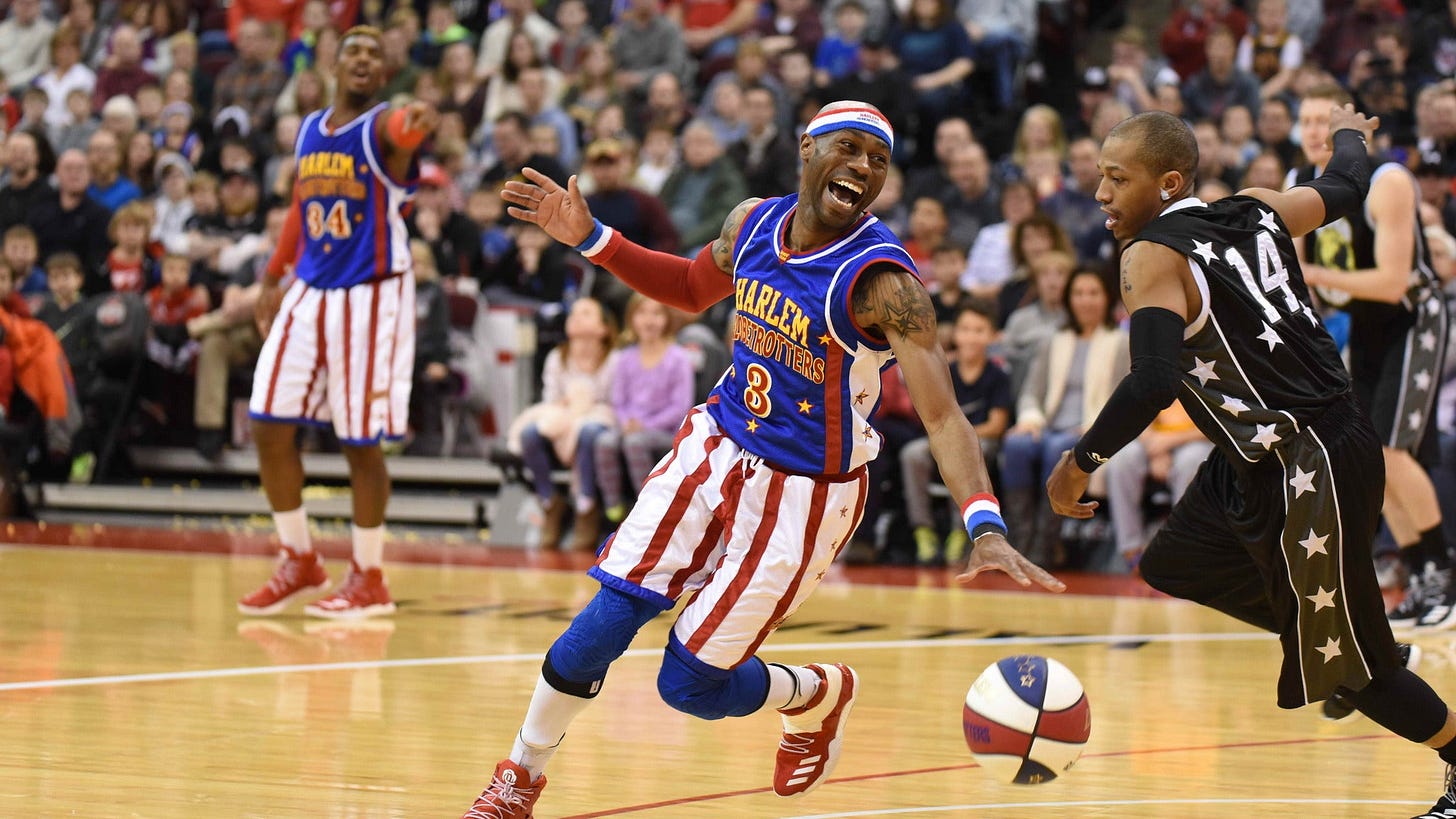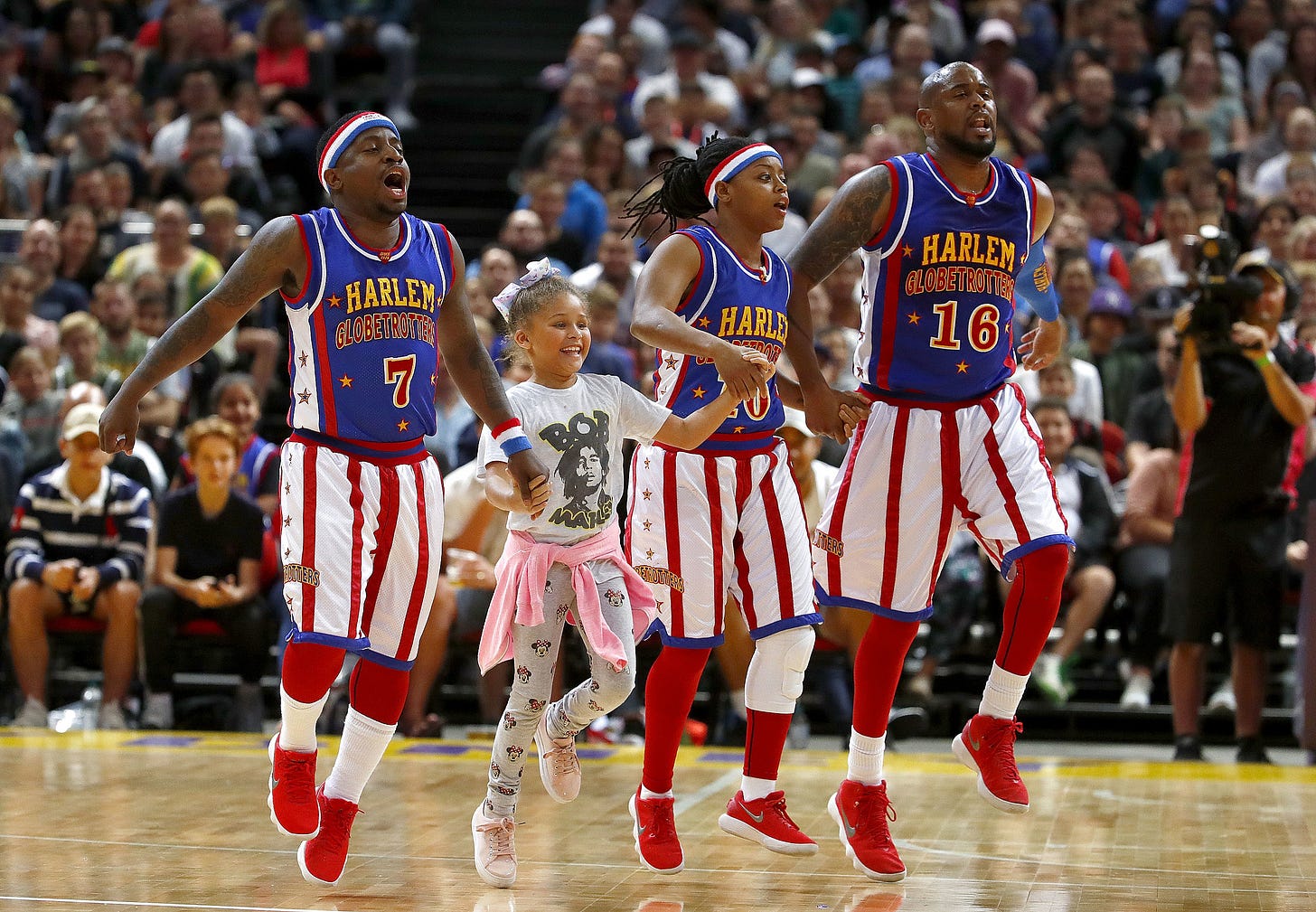Image: mtl.org
As a kid of any age, you cannot help but love the Harlem Globetrotters. The talent, the playfulness, the joy, the speed, the precision—they are mesmerizing. [Note to reader: this essay is best approached with Brother Bones’ classic version of “Sweet Georgia Brown” running in the background:
But laced in among the fake passes, buckets of confetti, and multiple balls dribbled and spun upon fingers resides a thoughtful approach to spirituality, irreverent reverence, that stands opposed to a danger that lurks for all of us, whether we think ourselves spiritual or not: idolatry.
American Idol
When we hear the word “idol” in today’s world, the mind goes one of two places. The first is metaphorical. Our idols are those public figures of whom we are fans. We admire them, or more usually their work, and treat them as special. This, of course, is not actual idolatry because we do not think them truly divine, but we do consider them more than normally human. In this way, the Harlem Globetrotters have been idols of ours since childhood, and remain so.
On the other hand, the literal sense of “idol,” as we understand it today, is shot through with eye-rolling naiveté. An idol is a human-made artifact, usually a statue, that is then treated as a holy object, as either a god itself or a representation of a god that acts as a portal for the power of the god. The idol is prayed to, revered, and sacrifices of material things are made to it.
But it, of course, is just another material object. It is made of the same atoms as we are. There is nothing really special about it and once we achieved knowledge at the level of a third grade chemistry lesson, the idea that this graven image contains magical powers became nothing short of silly, a relic (in this case literally) of a bygone age when people were not as wise and informed as we are.
But the notion of idolatry is deeper and more insidious than that. The idols we worship today are generally not material—fame, wealth, political ideology (left, right, and center). We hold up the famous, the wealthy, and the politically pure as priests, seeing them not as divine beings in themselves, but rather as those who are connected with the false gods we want to work through our lives. We do not worship them, but wish to be among them, equally receiving the largess of the idol we share with them.
This does not mean that anyone who thinks they deserve recognition, or who wants a raise, or who has strongly held policy views is idolatrous. Fame, wealth, and partisanship are not necessarily problematic in themselves. The problem is when we take a particular sort of stance toward them, as ends above all else, as perfect elements incapable of improvement, as necessary components to Being. Humans are intrinsically multifaceted and when we take some aspect and reify it, elevate it, turn it into a god, it has an equal and opposite reaction on us. We flatter it and it flattens us.
The Clown Princes
Image: sacramento365.com
This is where the Globetrotters’ magic circle expands humanity. Standing around mid-court before they play, passing the ball among themselves, each goofing and showing off in their own way, cheered on by the others, you see a combination of silliness and solemnity. Their tricks are lighthearted, but they could not play in that way unless they really knew how to play. The seriousness of inherent talent and years of intense work developing sound fundamentals combine to create the preconditions for the possibility of the goofiness they present to us.
The Globetrotters are the living personification of irreverent reverence. Someone who does not know how to play basketball will look silly trying, but that is a completely different sort of silliness than we see with the Globetrotters whose version is impossible without lifelong commitment. The members of the team love and respect the game. They have to in order to cultivate the ability to do what they are capable of doing nightly. But that reverence for basketball does not freeze the sport into a static form to be worshipped. Rather, it becomes malleable, an object to be played with, twisted into unexpected shapes, standard practices used as set-ups for impressive physical punch lines.
They have faced off for years against the Washington Generals. Washington is the seat of American political force, whereas generals are the locus of military might. The largely white opposing team represents the structural power embedded in our society. Is there anything that is more idolized in America than power? We treat it with reverent reverence. The distribution of social capital is not to be challenged. Those in control deserve to be in control because they have always been in control. We’re #1. USA! USA!
We see the referees through the same lens as the judge and jury, determining what is a crime and what punishment ought to be meted out under the inflexible rules. They enforce the reverent reverence and wo unto those who are insufficiently reverently reverent in their eyes. The Washington Generals and the refs, the butts of their jokes, are the symbols of contemporary idolatry.
And the Globetrotters face them undaunted. They will play basketball, the game they love, but will do it in their own fashion. They refuse to reverently revere it, instead injecting humor and humanity while demonstrating superhuman abilities. They oppose gravity as a physical force in the way they jump and shoot from half court, but also undermine gravity as seriousness in playing practical jokes on the ref and other coach and making behind the back and no-look passes that you would never see in real competition all the while talking it up with the other team. As the reverently reverent Generals get angry and frustrated, the irreverently reverent Globetrotters are joyful and successful. Their reverence giving rise to amazing feats while their irreverence making them a source of merriment.
Sweet Georgia Brown as the Music of the Spheres
Image: myb106.com
The Globetrotters provide us with a template for being human. Their irreverence does not reduce to nihilism. Basketball matters to them. There is something in life that is worth revering, worth working hard to develop skills for. They do aim to collectively use their talents to win the game.
But, as they show us, that reverence must be tempered with a healthy dose of irreverence, of joyful playfulness that leads us to creatively expand it and ourselves, to see both anew in unexpected ways. We cannot freeze it, assert its perfection and thereby alienate it from us. We must, in our reverence, take it in new directions, allow it to grow and become what will have seemed from one perspective absurd, but, from a new point of view, becomes transcendent.
The term “play” has wrongly been given a negative connotation. In a world governed by utility, where something must be useful as a means to wealth or power in order to be considered valuable, play is seen as a waste of time, effort, and resources. We are told to never be satisfied, that reverence requires that we always strive for further greatness, to shoot for the stars.
But the Globetrotters—stars who can really shoot—teach us differently. They instruct us to shrink our horizon to the now. Joy resides where we are. Yes, we must work hard, but not always for some delayed gratification that the structure tells us we should want. Rather, we can find ourselves as humans by playing against the structure, by affirming our existence by mocking it. If you are good at basketball, you should aim at an NBA championship ring. Trophies are mark of triumphant success. The Globetrotters don’t win trophies, yet their success resides someplace deeper—in being truly human.
When we approach life as a cosmic Globetrotter, the entire universe becomes our court and we are able to see the trophies as idols wrongly worshipped, the enforced cultural notions of success as the false gods that they are. It is in twisting social expectations, at times mocking them, and then overcoming them through authentic hard work to develop our talents, our individuality, in order to play creatively that we live joyful lives of irreverent reverence.
Just remember that sometimes the bucket really is full of water.











When our sons were barely 10, we took them to see the Globe Trotters at the Hershey Stadium in PA. Your description of their “irreverent reverence” for the game they mastered and playfully defied, is spot on. The players were demonstrably brilliant, child-like super-stars of their much loved sport, seriously entertaining and fun to be with.
In contrast, our older son Ben flew in from Denver in May to see his cherished Philadelphia 76ers in the NBA playoffs. (Ironically, the 76ers lost but his native Denver Nuggets finally won). Ben kindly treated us. This was my first actual in person NBA game -- as the cost of these tickets had been prohibitive to us many years ago.
What you generally see in the NBA now is massive individual egos, little evident fun or graceful team play. It’s all business, money-ball sports ad naseum, statistical capitalist self-branding, prima dona post-game interviews.
No wonder our predictably obnoxious sports announcers are so forgiving, so generally adoring. Their large paychecks literally depend on their (to me) embarrassing public worship of these truly impressive yet also tragic sports idols.
Tragic, because as talented sports idols -- they cannot escape the cold realization that their feet, too, are made of clay. While some of their fans look to them as Demi-gods, those so idolized must feel the unmistakable emptiness of the worship which they ironically invite.
Still, it’s a wondrous game.
I'm not a sports person but AMEN to this column! Superb.